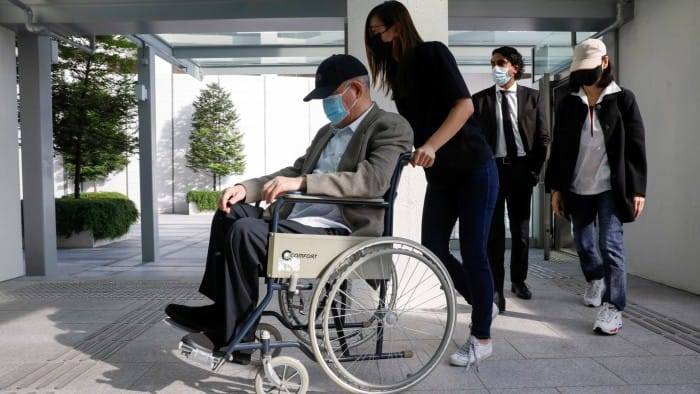Main Points In Hindi (मुख्य बातें – हिंदी में)
-
लिम ओन कुइन की सजा: लिम ओन कुइन, पूर्व तेल व्यापारी और सिंगापुर के अमीर व्यक्तियों में से एक, को एचएसबीसी को धोखा देने और जालसाजी में दोषी पाते हुए साढ़े 17 साल की जेल की सजा सुनाई गई है। यह मुद्दा कोविड महामारी के दौरान उठे कई अन्य घोटालों के बीच है।
-
सिंगापुर का कमोडिटी मार्केट सुधार: सिंगापुर की सरकार ने हाल के वर्षों में अपने कमोडिटी बाजार में धोखाधड़ी और संदिग्ध लेनदेन पर नकेल कसने के लिए कई उपाय किए हैं, जैसे डिजिटल दस्तावेज़ीकरण और सूचना साझा करने को बढ़ावा देना। यह प्रयास विश्वसनीयता को फिर से स्थापित करने के उद्देश्य से किया जा रहा है।
-
घोटालों का प्रभाव: कोविड महामारी के दौरान कमोडिटी की कीमतों में गिरावट के कारण कई व्यापारियों ने नुकसान छुपाने के लिए धोखाधड़ी का सहारा लिया। इस स्थिति ने बैंकों को कमोडिटी व्यापारियों को ऋण देने के लिए अधिक सख्त रुख अपनाने के लिए मजबूर किया है।
-
सरकारी कार्रवाई और नीतियाँ: सिंगापुर सरकार ने व्यापार वित्त रजिस्ट्रियों जैसी पहलों का परिचय दिया है, जो एक ही संपत्ति को विभिन्न संस्थानों को गिरवी रखने से रोकती हैं। इसके अतिरिक्त, सरकार डिजिटल रिकॉर्ड की दिशा में कदम बढ़ाने के लिए व्यापारियों को प्रेरित कर रही है।
- भविष्य की चुनौतियाँ: सिंगापुर का कमोडिटी ट्रेडिंग हब को दुबई की ओर से बढ़ते प्रतिस्पर्धा के बीच अपनी विशिष्टता बनाए रखने की चुनौती का सामना करना पड़ रहा है। इससे छोटे व्यापारियों के लिए वित्तपोषण प्राप्त करना कठिन हो सकता है।
Main Points In English(मुख्य बातें – अंग्रेज़ी में)
Here are the main points from the article:
-
Conviction and Sentencing: Lim Oon Kwan, a former oil trader, was sentenced to 17.5 years in prison for defrauding HSBC and promoting fraud, highlighting Singapore’s crackdown on suspicious transactions in the commodity trading sector.
-
Regulatory Changes: In response to scandals during the COVID-19 pandemic, Singapore has initiated measures to enhance transparency and trust in its commodity markets. This includes digital documentation efforts and promoting information sharing among market players.
-
Impact on Commodity Trading: The scandals, including Lim’s, have prompted Singapore to reassess its regulatory framework and tighten lending practices by banks, affecting both large and small trading firms in the region.
-
Shift towards Compliance: Singapore is increasing its compliance and regulatory measures in the commodity sector, with a government commitment to zero tolerance for fraud and initiatives aimed at preventing fraudulent practices in trade financing.
- Long-term Industry Effects: The cases and subsequent actions are seen as a lesson for the industry, leading to stricter scrutiny by banks and making it more challenging for smaller traders to secure financing due to increased caution after the scandals.


Complete News In Hindi(पूरी खबर – हिंदी में)
कोविड महामारी के चरम पर घोटालों की एक श्रृंखला के बाद, अपने कमोडिटी ट्रेडिंग क्षेत्र पर लगाम लगाने के सिंगापुर के प्रयासों की परिणति एक पूर्व तेल व्यापारी के लिए लंबी जेल की सजा में हुई, जो अब 80 वर्ष का हो चुका है।
लिम ओन कुइन – जिन्हें ओके लिम के नाम से जाना जाता है, और एक समय सिंगापुर के सबसे अमीर व्यक्तियों में से एक थे – को मई में एचएसबीसी को धोखा देने और जालसाजी को बढ़ावा देने का दोषी पाया गया था। 82 वर्षीय सजा सुनाई गई नवंबर में साढ़े 17 साल की जेल की सजा के फैसले में न्यायाधीश ने कहा कि इसे “निवारक” के रूप में कार्य करने के लिए डिज़ाइन किया गया था। लिम के बचाव पक्ष के वकील ने व्हीलचेयर पर बैठे अपने मुवक्किल की उम्र और खराब स्वास्थ्य का हवाला देते हुए अपील की है।
कठोर सज़ा इसका उदाहरण है कि कैसे सिंगापुर ने अपने कमोडिटी बाजार में संदिग्ध लेनदेन पर नकेल कसने की कोशिश की है। इसने दस्तावेज़ीकरण को डिजिटल बनाने के उद्देश्य से पहल शुरू की है जो कमोडिटी बाजार की रीढ़ है, जबकि धोखाधड़ी को रोकने के लिए बाजार के खिलाड़ियों के बीच व्यापक सूचना-साझाकरण को प्रोत्साहित किया जाता है।
कंसल्टेंसी लैंबर्ट कमोडिटीज के संस्थापक भागीदार जीन-फ्रांकोइस लैंबर्ट ने कहा, “सिंगापुर ने महसूस किया है कि उन्हें कदम बढ़ाने और कुछ विश्वसनीयता का पुनर्निर्माण करने की जरूरत है।” “वे इन घोटालों को अधिक गंभीरता से ले रहे हैं।”
वैश्विक वस्तुओं के केंद्र के रूप में सिंगापुर की प्रतिष्ठा उसकी सरकार के व्यापार-अनुकूल दृष्टिकोण के साथ-साथ समुद्री मार्गों पर उसकी स्थिति के कारण है जो चीन को वैश्विक बाजारों से जोड़ती है।
ट्रैफिगुरा, विटोल ग्रुप, गनवोर और मर्कुरिया सहित सभी वैश्विक व्यापारिक घरानों के आधार शहर में हैं, जो एशिया का सबसे बड़ा तेल व्यापार केंद्र है और कृषि वस्तुओं के व्यापार के लिए दुनिया में सबसे बड़े में से एक है। शहर राज्य ने तेजी से बढ़ते कार्बन व्यापार का केंद्र बनने पर भी ध्यान केंद्रित किया है।
कमोडिटी ट्रेडिंग हब के रूप में दुबई के तेजी से बढ़ने के बाद, विशेष रूप से पश्चिमी सरकारों द्वारा प्रतिबंधों के तहत रूसी सामानों के लिए, इसे खुद को अलग करने की आवश्यकता और अधिक तीव्र हो गई है।
अक्टूबर में सिंगापुर के मेगा टुआस पोर्ट प्रोजेक्ट में एक कार्यक्रम के दौरान प्रधान मंत्री लॉरेंस वोंग ने कहा, “वैश्विक इतिहास का लंबा भाग उन बंदरगाहों की कहानियों से भरा है जो दशकों तक फले-फूले और बदलती परिस्थितियों के बीच गिरावट आई।” “सबक यह है कि हम आत्मसंतुष्ट नहीं हो सकते।”
लिम मामला, सिंगापुर में कई अन्य लोगों के साथ, 2020 में सामने आया, जब कोविड महामारी के प्रकोप के कारण कमोडिटी की कीमतों में गिरावट आई। लिम की कंपनी, हिन लेओंग, अप्रैल 2020 में ढह गई और उन्होंने स्वीकार किया $800 मिलियन का घाटा छिपाना लेनदारों से, जिसमें दुनिया के कुछ सबसे बड़े बैंक शामिल थे।
वह शहर राज्य के कई व्यापारिक घरानों में से सबसे बड़ा था जो उस वर्ष ध्वस्त हो गया था। अन्य में तेल डीलर ज़ेनरॉक और एग्रीट्रेड इंटरनेशनल, एक व्यापारी शामिल थे धोखाधड़ी का आरोप इसके ऋणदाताओं द्वारा. शेडोंग स्थित रिफाइनर की व्यापारिक शाखा होनटॉप एनर्जी, रिसीवरशिप में चली गई और उसके सबसे बड़े ऋणदाता द्वारा “संदिग्ध लेनदेन” का आरोप लगाया गया।
घोटालों का एक सामान्य विषय संदिग्ध कागजी कार्रवाई थी, जिसका उपयोग घाटे को छिपाने और कमोडिटी की कीमतों पर लीवरेज्ड दांव लगाने के लिए वित्तीय संस्थानों से ऋण सुरक्षित करने के लिए किया जाता था। बैंक मोटी फीस की उम्मीद में व्यापारियों को ऋण देने को तैयार थे।
सिंगापुर में विशेषज्ञ ऊर्जा और कमोडिटी लॉ फर्म ब्लैकस्टोन एंड गोल्ड के प्रबंध निदेशक बलदेव भिंडर ने कहा, “कागजी दस्तावेज़ हमेशा अंतरराष्ट्रीय व्यापार की धुरी रहे हैं।”
लिम को अपने अधिकारियों को दो दस्तावेज़ बनाने के लिए प्रोत्साहित करने का दोषी पाया गया, जो कथित तौर पर तेल बिक्री अनुबंध थे, जिसके कारण एचएसबीसी ने कंपनी को लगभग 112 मिलियन डॉलर का भुगतान किया।
इसके पतन के समय, हिन लेओंग पर $3.85 बिलियन का बकाया था। एचएसबीसी का सबसे बड़ा एक्सपोजर $600 मिलियन था, उसके बाद एबीएन एमरो का $300 मिलियन था, जबकि फ्रांसीसी ऋणदाता सोसाइटी जेनरल ने कंपनी को $240 मिलियन का ऋण दिया था। सिंगापुर के बैंकों – डीबीएस ग्रुप, ओसीबीसी बैंक और यूनाइटेड ओवरसीज बैंक – का एक्सपोज़र $680 मिलियन था।
एचएसबीसी ने ज़ेनरॉक को 49 मिलियन डॉलर का ऋण भी दिया, लेकिन दिवालिया व्यापारी के बारे में सिंगापुर की पुलिस को रिपोर्ट कर दी। इसे “बेईमान आचरण” के रूप में वर्णित किया गया है।
पाया गया कि एग्रीट्रेड को 26 ऋणदाताओं से 1.5 अरब डॉलर का ऋण दिया गया था। इसके लेनदारों ने व्यवसाय पर ऋण के खिलाफ सुरक्षा के रूप में कई बैंकों को डुप्लीकेट बिल ऑफ लैडिंग – परिवहन कंपनियों द्वारा शिपर्स को जारी किए गए कानूनी दस्तावेज – जारी करने के माध्यम से धोखाधड़ी का आरोप लगाया।
“अभियोजक अधिक सक्रिय दृष्टिकोण अपना रहे हैं,” कीडन हैरिसन में वैश्विक धोखाधड़ी और व्यापार विवादों में विशेषज्ञता वाले यूके स्थित वकील किट स्मिथ ने कहा। “बड़े पैमाने पर धोखाधड़ी पर अधिक सख्ती बरतने और अपराधियों के खिलाफ उदाहरण बनाने पर जोर दिया जा रहा है।”
एंटरप्राइज़ सिंगापुर, जिस सरकारी एजेंसी पर व्यवसाय को बढ़ावा देने का आरोप है, ने कहा कि “सिंगापुर में धोखाधड़ी गतिविधियों के लिए शून्य सहिष्णुता है”।
फाइनेंशियल टाइम्स को दिए एक बयान में कहा गया है, “अतीत में कमोडिटी ट्रेडिंग क्षेत्र में देखे गए धोखाधड़ी के मामलों को कमजोर प्रकटीकरण प्रथाओं और कुछ व्यापारिक कंपनियों के बीच आंतरिक नियंत्रण के लिए जिम्मेदार ठहराया गया है।”
“जब सिंगापुर के अधिकारियों को व्यापार क्षेत्र में वित्तीय धोखाधड़ी का पता चलेगा, तो हम अपराधियों को पकड़ने के लिए तत्काल कार्रवाई करेंगे, जैसा कि हिन लिओंग के मामले में देखा गया है।”
सरकार ने हाल के वर्षों में धोखेबाजों की लेनदारों को धोखा देने की क्षमता को बाधित करने के उद्देश्य से कई पहल भी शुरू की हैं।
उनमें से एक व्यापार वित्त रजिस्ट्री है जो एक ही संपत्ति को विभिन्न संस्थानों को एक से अधिक ऋण के लिए सुरक्षा के रूप में गिरवी रखने से रोकती है। सरकार ने जालसाजी को कम करने के लिए व्यापारियों को सार्वजनिक ब्लॉकचेन पर डिजिटल रिकॉर्ड का आदान-प्रदान करने के बजाय, कागजी दस्तावेज़ीकरण से दूर जाने के लिए प्रोत्साहित करने का भी प्रयास किया है।
जबकि लैंबर्ट ने कहा कि सिंगापुर “अनुपालन और नियामक आवश्यकताओं के मामले में दांव बढ़ा रहा है”, उन्होंने कहा कि नियामकों को पिछले लेखांकन घोटालों में दृढ़ रहना चाहिए था।
घोटालों ने बैंकों को कमोडिटी व्यापारियों को ऋण देने के लिए और अधिक सख्त रुख अपनाने के लिए मजबूर किया है। कई ऋणदाताओं ने घोषणा की कि वे हैं बाज़ार से बाहर निकाला जा रहा है 2020 में.
भिंडर ने कहा, “बैंक अब अपने ग्राहकों से काफी सतर्कता के साथ संपर्क कर रहे हैं, जो अच्छी बात है, लेकिन इसका मतलब है कि छोटे व्यापारियों को वित्तपोषण आकर्षित करना कठिन हो रहा है।”
“लिम की सजा ने सिंगापुर और कमोडिटी ट्रेडिंग बाजार के लिए एक अध्याय बंद कर दिया है – यह हर किसी के लिए सीखने का अनुभव रहा है।”
Complete News In English(पूरी खबर – अंग्रेज़ी में)
During the peak of the COVID pandemic, Singapore’s efforts to rein in its commodity trading sector culminated in a long prison sentence for a former oil trader, who is now 80 years old, following a series of scandals.
Limm On Kwan, known as Ok Lim and once one of Singapore’s wealthiest individuals, was found guilty of defrauding HSBC and promoting forgery in May. The 82-year-old was sentenced in November to 17 and a half years in prison, with the judge stating that the sentence was designed to act as a deterrent. Lim’s defense lawyer cited his age and poor health, as he appeared in court in a wheelchair, to appeal the decision.
This harsh sentence exemplifies how Singapore has tried to crack down on dubious transactions in its commodity market. The government has launched initiatives aimed at digitizing documentation that is critical to the commodity market while promoting extensive information-sharing among market players to prevent fraud.
Jean-François Lambert, founding partner of consultancy Lambert Commodities, commented, “Singapore has realized that they need to step up and rebuild some credibility. They are taking these scandals more seriously.”
Singapore’s reputation as a global commodities hub is bolstered by its pro-trade government policies and its strategic location, connecting China to global markets.
Global trading firms like Trafigura, Vitol Group, Gunvor, and Mercuria are based in the city, making it Asia’s largest oil trading center and one of the largest in the world for agricultural commodities. The city-state is also focusing on becoming a hub for the rapidly growing carbon market.
After Dubai’s commodity trading hub rapidly expanded—especially due to Western sanctions on Russian goods—Singapore felt a heightened need to differentiate itself.
During an event in October at Singapore’s Tuas mega port project, Prime Minister Lawrence Wong stated, “The long history of global trade is full of stories about ports that thrived for decades but declined due to changing conditions. The lesson is that we cannot be complacent.”
The Lim case, among several others in Singapore, emerged in 2020 when commodity prices plummeted due to the COVID pandemic. Lim’s company, Hin Leong, collapsed in April 2020, and he admitted to hiding an $800 million loss from creditors, including some of the world’s largest banks.
At the time of its collapse, Hin Leong owed $3.85 billion. HSBC had the largest exposure with $600 million, followed by ABN Amro with $300 million, and French lender Société Générale with $240 million. Local banks like DBS Group, OCBC Bank, and United Overseas Bank had exposure totaling $680 million.
HSBC also lent $49 million to Zenrock but reported the bankrupt trader to Singapore police, describing the behavior as “dishonest.”
Agritrade, another affected trader, reportedly took out $1.5 billion from 26 lenders. Creditors accused the company of fraud by issuing duplicate bills of lading to multiple banks.
Kit Smith, a UK lawyer specializing in global fraud and trade disputes, noted, “Prosecutors are adopting a more active approach, emphasizing strict action against large-scale fraud and setting an example with criminals.”
Enterprise Singapore, the government agency tasked with promoting business, stated there is “zero tolerance for fraudulent activities in Singapore.”
In a statement to the Financial Times, it was noted that past fraud cases in the commodity trading sector were attributed to weak disclosure practices and inadequate internal controls in some trading firms.
“When Singaporean authorities uncover financial fraud in the trading sector, we will take immediate action to apprehend offenders, as seen in the Hin Leong case.”
The government has also initiated several measures aimed at preventing offenders from defrauding creditors in recent years.
One of these measures is the trade finance registry, which aims to prevent the same asset from being pledged multiple times to different lenders. The government has also attempted to encourage traders to move away from paper documentation and use public blockchain for digital records to reduce fraud risks.
While Lambert stated that Singapore is raising the stakes regarding compliance and regulatory requirements, he suggested that regulators should remain firm on past accounting scandals.
The scandals have forced banks to adopt a stricter stance on lending to commodity traders. Many lenders have announced that they are pulling out of the market since 2020.
Bhinder mentioned, “Banks are now interacting with their clients with much more caution, which is good, but it means that smaller traders are finding it harder to secure financing.”
“Lim’s sentence marks the closing of a chapter for Singapore and its commodity trading market – it has been a learning experience for everyone.”








